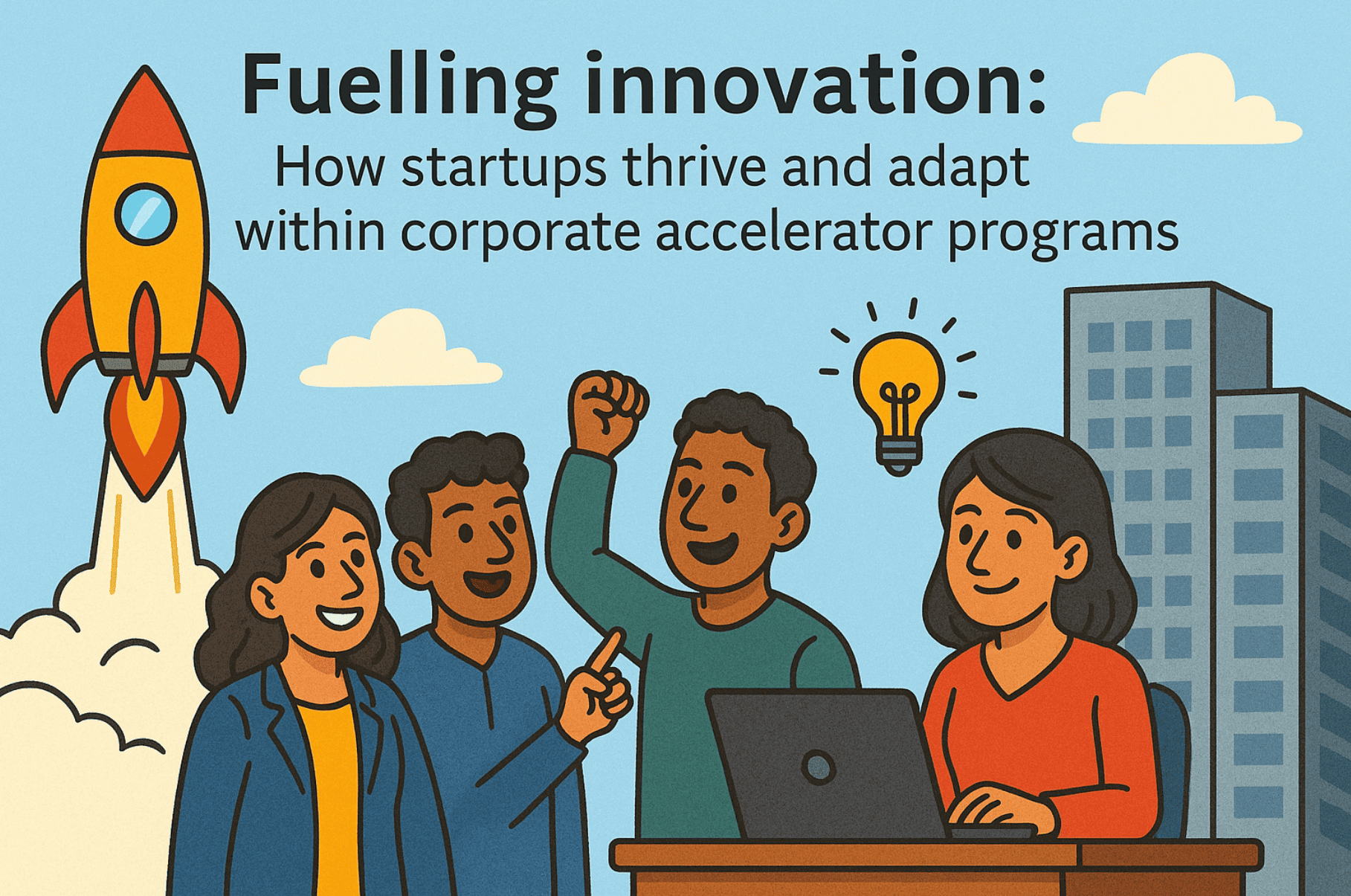
11 May FUELLING INNOVATION: HOW STARTUPS THRIVE AND ADAPT WITHIN CORPORATE ACCELERATOR PROGRAMS
Banner image generated using ChatGPT, OpenAI, May 09, 2025
In today’s fast-moving innovation landscape, incubators and corporations are forging partnerships that go far beyond sponsorship logos and press releases. These collaborations are reshaping how startups access mentorship, resources, and funding-especially when tailored to specific industries. But as with any high-stakes dance, there are both dazzling moves and tricky steps along the way.
The Power of Industry-Specific Partnerships
At their best, partnerships between incubators and corporations create a win-win scenario. Startups gain access to a wealth of industry expertise and resources that would otherwise be out of reach, while corporations tap into fresh ideas and disruptive technologies that can revitalize their own business models.
Tailored Mentorship:
One of the most significant advantages for startups in these programs is access to seasoned mentors who understand the nuances of a particular industry. For example, a health tech startup in an incubator backed by a major hospital group can receive guidance on regulatory compliance, clinical trials, and go-to-market strategies from people who have navigated those very waters.
Resource Power-Ups:
Beyond mentorship, corporations often open up their R&D labs, pilot programs, and customer networks. This hands-on support allows startups to test their products in real-world environments, gather feedback, and iterate rapidly – an invaluable edge in competitive sectors like fintech, biotech, or clean energy.
Strategic Funding:
Unlike traditional venture capital, corporate funding is often more than just a financial transaction. It’s a strategic investment, with corporations providing not only capital but also validation and potential pathways to acquisition or partnership. This alignment of interests can help startups scale faster and more sustainably.
Credibility and Market Access:
Being associated with a respected corporate partner lends startups instant credibility. It can open doors to new customers, investors, and markets that might otherwise remain closed or out of reach for startups.
The Flip Side: Challenges Beneath the Surface
Of course, these partnerships aren’t without their complications. The intersection of nimble startups and established corporations can create friction-and sometimes, outright conflict.
Loss of Independence:
Startups may feel pressure to pivot their vision or product to align with the corporate sponsor’s priorities. This can stifle innovation or lead to mission drift if not managed carefully.
Cultural Clashes:
Startups are built for speed and risk-taking, while corporations often prioritize stability and process. These differences can lead to misunderstandings, slow decision-making, or frustration on both sides.
Intellectual Property and Equity Concerns:
Questions about who owns the IP developed during the partnership can become contentious, especially if expectations aren’t set clearly from the outset.
Resource Competition:
Not all startups in a corporate-backed incubator receive equal attention or support. Some may feel sidelined if resources are concentrated on ventures that align more closely with the corporate’s strategic interests.
Exit Complexities:
When it’s time for a startup to “graduate” from the incubator, unclear exit strategies can create tension or even jeopardize future collaboration.
Turning Challenges into Bright Sides
The good news? Many of these flip sides can be transformed into bright sides with the right approach:
- Transparent Communication: Open, honest dialogue about goals, expectations, and boundaries can help maintain startup independence while aligning with corporate interests.
- Mutual Learning: Embracing cultural differences as an opportunity for mutual growth can blend the agility of startups with the strategic discipline of corporations.
- Clear Agreements: Well-drafted contracts around IP, equity, and resource allocation reduce ambiguity and foster trust.
- Structured Support: Designing programs that ensure equitable access to mentorship and resources can level the playing field for all participating startups.
- Thoughtful Exits: Planning for the end of the partnership from the beginning ensures smooth transitions and preserves valuable relationships.
The Bottom Line
When incubators and corporates collaborate thoughtfully, the results can be transformative – fueling mentorship, funding, and innovation that neither could achieve alone. While challenges are inevitable, many can be turned into strengths through transparency, clear alignment, and mutual respect. In this high-stakes dance, the most successful partnerships are those where both sides learn to move in sync, creating a vibrant ecosystem where startups thrive and corporations stay ahead of the curve.


